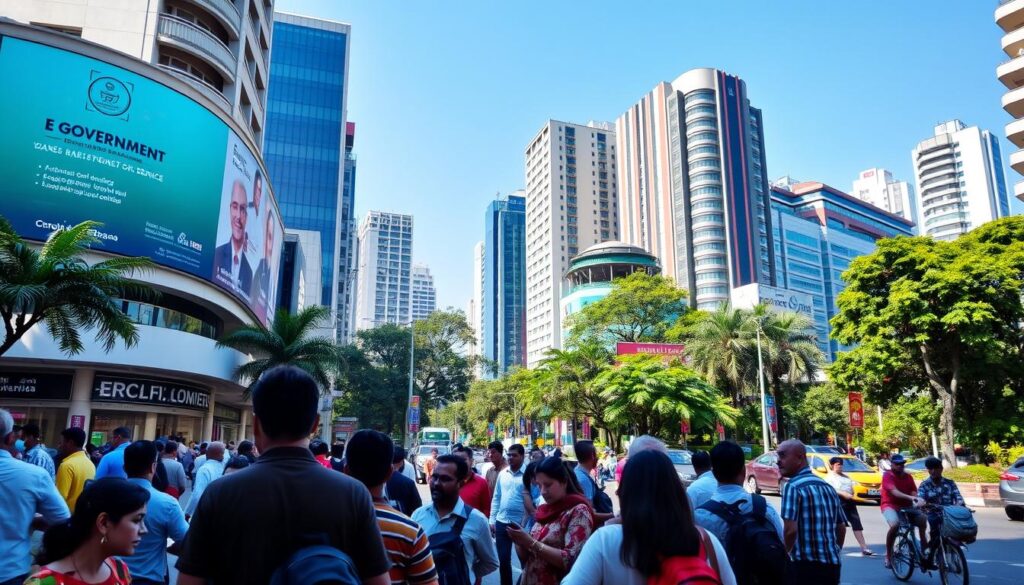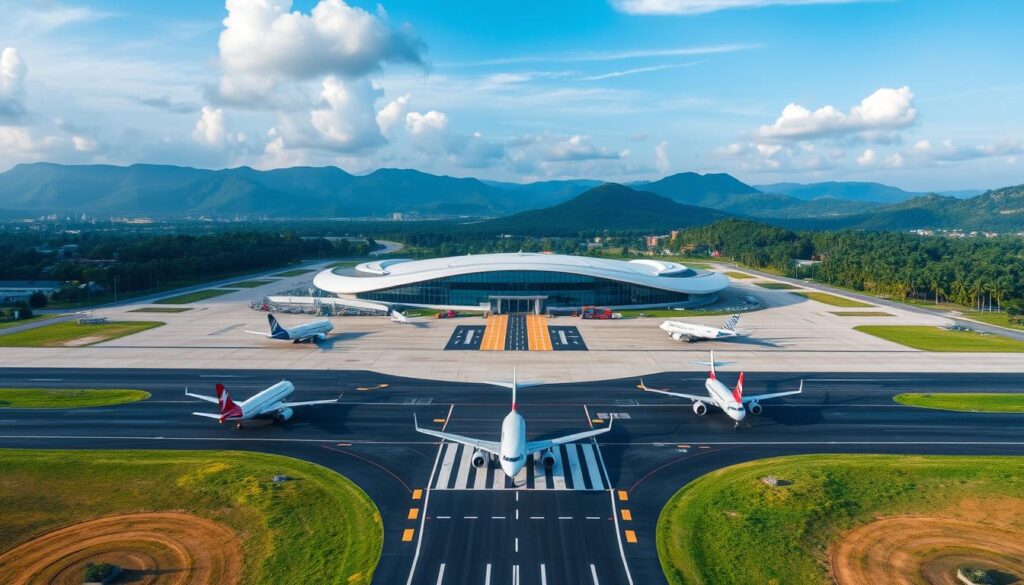Commonwealth Union Supports Appé Lanka’s Educational Work
The Commonwealth Union Ltd. has teamed up with Appé Lanka Foundation. They aim to support community development in Northern Sri Lanka’s Poonakary region. This partnership shows how international aid can uplift struggling communities.
Shaan Corea, Appé Lanka’s founder, met with Nirj Deva, Commonwealth Union President. They talked about the partnership’s potential impact. The union’s support will boost the foundation’s efforts to tackle key issues.
Appé Lanka focuses on water scarcity, education access, and job opportunities. They mainly help women and women-headed households. As a grassroots non-profit, they’ve already made big changes in Poonakary.
The foundation takes a complete approach to community improvement. They work on water purification, renewable energy, and transportation solutions. They also provide educational support to create lasting positive change.
Appé Lanka’s Grassroots Initiatives Transform Poonakary Region
Appé Lanka is changing lives in Sri Lanka’s Poonakary region. The non-profit tackles water scarcity, education, food security, and reconciliation in rural areas. Their grassroots efforts are making a real difference.
Addressing Water Crisis with Reverse Osmosis Plants
Poonakary faced a severe lack of clean drinking water. Appé Lanka installed Reverse Osmosis plants to purify water. This move greatly improved local health, especially for children and the elderly.
Holistic Approach: Water, Education, Food Security, and Reconciliation
Appé Lanka takes a well-rounded approach to community development. They run literacy programs and skill training workshops for youth empowerment. The foundation also boosts food security through community gardens and farmer training.
Appé Lanka promotes reconciliation in post-war Sri Lanka. They bring diverse communities together, fostering unity and understanding. This work is key for lasting peace and growth.
Inspiring Example of Compassionate, Grassroots Development
Appé Lanka’s work in Poonakary shows how grassroots efforts can uplift communities. They work closely with locals to ensure sustainable, needs-based solutions. Their success proves the power of teamwork in tackling social issues.
The foundation continues to be a beacon of hope. They show that positive change is possible through hard work and commitment. Appé Lanka’s impact in Poonakary inspires communities across Sri Lanka.
Commonwealth Union Supports Appé Lanka’s Grassroots Educational Efforts
The partnership between Commonwealth Union and Appé shows true dedication to Corporate Social Responsibility. They support Appé Lanka’s educational initiatives in Poonakary. Their goal is to make a lasting impact on underprivileged communities.
Partnership Demonstrates Dedication to Corporate Social Responsibility
Commonwealth Union’s support for Appé Lanka shows their commitment to helping marginalized communities. This teamwork brings diverse groups together to tackle educational challenges in Poonakary.
The partnership supports several key initiatives. These include providing school supplies and distributing bicycles to students. They also install water purifying systems in schools.
- Providing school supplies, such as exercise books, to reduce absenteeism and support educational outcomes
- Distributing bicycles to school children to prevent dropouts and improve attendance rates
- Installing water purifying systems in 30 schools, with plans to expand this initiative to address water shortages
Goal: Making a Lasting, Positive Difference in Underprivileged Communities
The partnership aims to create long-term impact in underprivileged communities. They focus on education to empower people with knowledge and skills. This helps break the cycle of poverty.
Appé Lanka and Commonwealth Union run workshops and exchange programs. They also develop livelihood initiatives. These efforts promote peace and understanding in the Poonakary region.
By investing in education, they’re building a brighter future. Their work paves the way for prosperity in these communities.
Sustainable Initiatives Empower Northern Sri Lankan Communities
Appé Lanka uplifts underprivileged communities in Northern Sri Lanka through sustainable initiatives. Their projects cover renewable energy, transportation, peace-building, education, and employment. These efforts foster resilience and unity in the region.
Providing Renewable Energy through Solar Systems
Appé Lanka installs solar systems in schools and community centers. This renewable energy solution offers reliable power and promotes environmental sustainability. It has improved educational facilities and enabled evening community gatherings.
Addressing Transportation Challenges with Bicycle Distribution
Appé Lanka distributes bicycles to rural school children. This has cut travel time and boosted school attendance. It also promotes physical activity among youth.
By giving students mobility, the organization supports their educational success. It also contributes to their overall well-being.
Promoting Peace and Reconciliation through Workshops and Exchange Programs
Appé Lanka actively promotes peace in this conflict-affected region. They run workshops and exchange programs that unite people from different communities. These initiatives foster dialogue, understanding, and unity.
Their efforts help break down barriers and heal wounds. They’re building a foundation for a harmonious future.
Supporting Education by Providing School Supplies
Education is a key focus for Appé Lanka. They’ve installed water purifying systems in 30 schools. The organization also provides essential school supplies like exercise books.
By ensuring clean water and basic materials, they create a good learning environment. This supports the academic growth of children in the region.
Creating Sustainable Employment for Women and Women-Headed Households
Appé Lanka focuses on economic empowerment, especially for women. They run livelihood programs offering skills training and market access. These programs create sustainable job opportunities.
This enables women to gain financial independence. It also helps them contribute to their families’ well-being.
FAQ
What is the Commonwealth Union’s role in supporting Appé Lanka’s educational efforts?
The Commonwealth Union partners with Appé Lanka Foundation to support grassroots education in Northern Sri Lanka. This collaboration showcases their commitment to Corporate Social Responsibility. It aims to create lasting change in underprivileged communities.
How did Appé Lanka’s journey begin?
Appé Lanka’s founder, Shaan Corea, visited Poonakary and saw the community’s daily struggles. Moved by their situation, he started the foundation to tackle pressing issues. The first focus was addressing the region’s water crisis.
What was Appé Lanka’s first initiative in the Poonakary region?
Appé Lanka tackled the water crisis by installing Reverse Osmosis plants. These plants provide clean, safe drinking water to locals.
What other areas does Appé Lanka focus on in its holistic approach to development?
Appé Lanka takes a well-rounded approach to development in Poonakary. They focus on education, food security, nutrition, and reconciliation efforts.
How does Appé Lanka’s work demonstrate the power of collaboration in transforming underprivileged communities?
Appé Lanka’s work shows how teamwork can change underprivileged communities. By joining forces with groups like the Commonwealth Union, they boost their impact. This allows them to help more people in need.
What are some of the sustainable initiatives undertaken by Appé Lanka to empower communities in Northern Sri Lanka?
Appé Lanka runs several sustainable projects in Northern Sri Lanka. They provide solar energy systems and give bicycles to school kids. The foundation also holds workshops to promote peace.
They supply exercise books to students and create jobs for women. These efforts focus on women-headed households too.
How has Appé Lanka addressed water shortages in schools?
Appé Lanka has solved water shortages in 30 schools. They installed water purifying systems to ensure students have clean drinking water.


